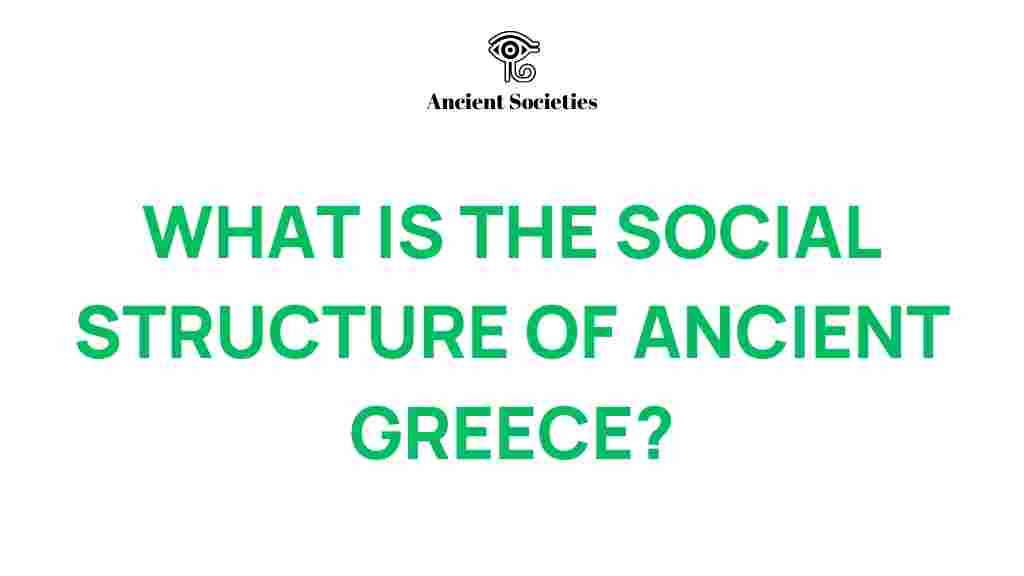Unveiling the Social Structure of Ancient Greece
Ancient Greece is often celebrated as the cradle of Western civilization, renowned for its profound contributions to philosophy, art, and governance. However, one of the most fascinating aspects of Ancient Greece is its complex social structure. This article delves into the intricate tapestry of social hierarchy, citizenship, and the diverse city-states that defined Ancient Greek culture.
Understanding the City-States
The concept of city-states, or *poleis*, was fundamental to Ancient Greece. Each city-state operated independently, with its own government, laws, and social norms. The most notable city-states included:
- Athens: Known for its early form of democracy and cultural achievements.
- Sparta: Renowned for its military-oriented society and strict social order.
- Corinth: A major commercial hub with a powerful oligarchy.
- Thebes: A significant player in Greek politics known for its military prowess.
Each city-state had its own unique *social structure*, reflecting its values and priorities.
The Hierarchical Structure
The *social structure* of Ancient Greece was characterized by a clear hierarchy, which can be broken down into several distinct classes:
- Citizens: Free-born men who had the right to vote and participate in political life. In Athens, citizenship was limited to those born to Athenian parents.
- Metics: Resident foreigners who were not granted full citizenship rights but contributed to the economy.
- Slaves: A significant portion of the population, slaves were considered property and had no rights.
- Aristocracy: Wealthy landowners who wielded power and influence, particularly in city-states like Athens and Corinth.
This hierarchy not only shaped political dynamics but also influenced cultural and economic exchanges within the *city-states*.
Democracy and Citizenship
Athens is often heralded as the birthplace of democracy, where citizens could participate directly in decision-making. The *social structure* of Athens allowed for a form of governance that was revolutionary for its time:
- Direct Participation: Citizens gathered in assemblies to discuss and vote on laws and policies.
- Random Selection: Many government officials were chosen by lot, ensuring that any citizen could take part in governance.
- Political Rights: Citizens were expected to participate in civic life, and those who did not were often shamed.
However, it is crucial to note that this *democracy* was limited; women, slaves, and metics were excluded from these rights, showcasing the *hierarchy* that defined Athenian society.
Philosophy and Culture
The *culture* of Ancient Greece was deeply intertwined with its *social structure*. Philosophers like Socrates, Plato, and Aristotle explored ideas of justice, virtue, and governance, influencing not only their contemporaries but also future generations. Their teachings often critiqued the existing social order and sought to define the role of the individual in society.
Key contributions to *philosophy* included:
- Ethics: Discussions on morality and the ideal society.
- Epistemology: The study of knowledge and belief systems.
- Political Philosophy: The exploration of governance and the rights of citizens.
These philosophical explorations contributed to the evolving *social structure* and encouraged citizens to reflect on their roles within the city-state.
The Economy of Ancient Greece
The *economy* of Ancient Greece was diverse and complex, heavily influenced by its geography and trade practices. Key factors in the *social structure* included:
- Agriculture: The backbone of the economy, with crops such as olives and grapes being staples.
- Trade: City-states engaged in extensive trade across the Mediterranean, leading to wealth and cultural exchanges.
- Craftsmanship: Skilled artisans contributed to local economies through pottery, metalwork, and textiles.
The economic prosperity of some city-states helped foster a wealthy *aristocracy* that could influence political decisions and cultural developments.
Challenges and Troubleshooting the Social Hierarchy
Despite the rich cultural and philosophical advancements, the *social structure* of Ancient Greece was not without its challenges. Issues such as:
- Class Struggles: Tensions often arose between the aristocracy and the lower classes, leading to social unrest.
- Exclusion of Groups: The lack of political rights for women and slaves created divisions and dissatisfaction.
- Warfare: Frequent conflicts among city-states disrupted social order and economic stability.
Addressing these challenges required innovative thinking and, in some cases, reforms that attempted to balance power among the various classes within the *social structure*.
Conclusion: The Legacy of Ancient Greece
The *social structure* of Ancient Greece remains a topic of fascination for historians and social scientists alike. Its unique blend of democracy, philosophy, and economic activity laid the groundwork for future civilizations. By understanding the complexities of its *city-states*, citizenship, and social hierarchy, we gain valuable insights into the foundations of modern society.
For those interested in exploring further, you can read more about the impact of Ancient Greece on modern democracy here.
In summary, the *social structure* of Ancient Greece was a dynamic tapestry woven from the threads of its culture, economy, and philosophy, offering lessons that resonate even today.
This article is in the category Society and created by AncientSocieties Team
